Relationship Between Leadership, Psychological Capital, and Emotions
VerifiedAdded on 2023/04/19
|8
|2445
|188
Report
AI Summary
This report delves into the multifaceted relationship between authentic leadership, Leader-Member Exchange (LMX), and employee psychological capital, exploring their combined impact on employee performance and organizational outcomes. It defines authentic leadership as a behavior pattern that fosters a positive ethical climate and the development of positive psychological capacities, leading to increased self-awareness and relational transparency. The report highlights the importance of psychological capital, characterized by self-efficacy, optimism, hope, and resilience, and its positive correlation with employee engagement and performance. Furthermore, it examines how organizations can build psychological capital for different employee types. The report also analyzes the impact of emotions on employee performance, emphasizing the role of emotional intelligence and the influence of emotions on decision-making, job satisfaction, and overall workplace dynamics. It discusses the importance of employee engagement, exploring concepts like absorption and dedication, and differentiating between work engagement and burnout. Ultimately, the report underscores the significance of creating a positive work environment that supports both employee well-being and organizational success.

MANAGEMENT
Page 0 of 8
Page 0 of 8
Paraphrase This Document
Need a fresh take? Get an instant paraphrase of this document with our AI Paraphraser
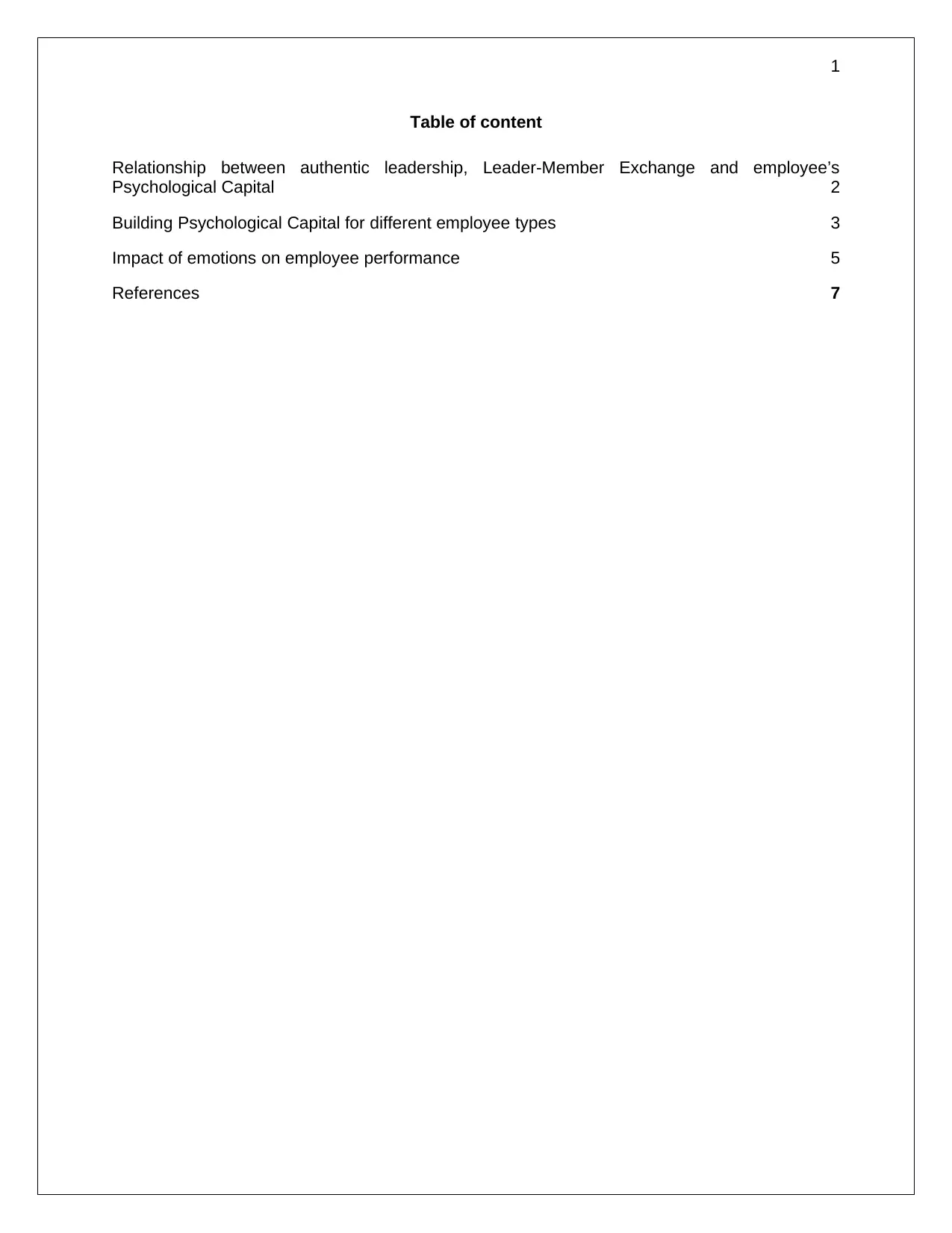
1
Table of content
Relationship between authentic leadership, Leader-Member Exchange and employee’s
Psychological Capital 2
Building Psychological Capital for different employee types 3
Impact of emotions on employee performance 5
References 7
Table of content
Relationship between authentic leadership, Leader-Member Exchange and employee’s
Psychological Capital 2
Building Psychological Capital for different employee types 3
Impact of emotions on employee performance 5
References 7
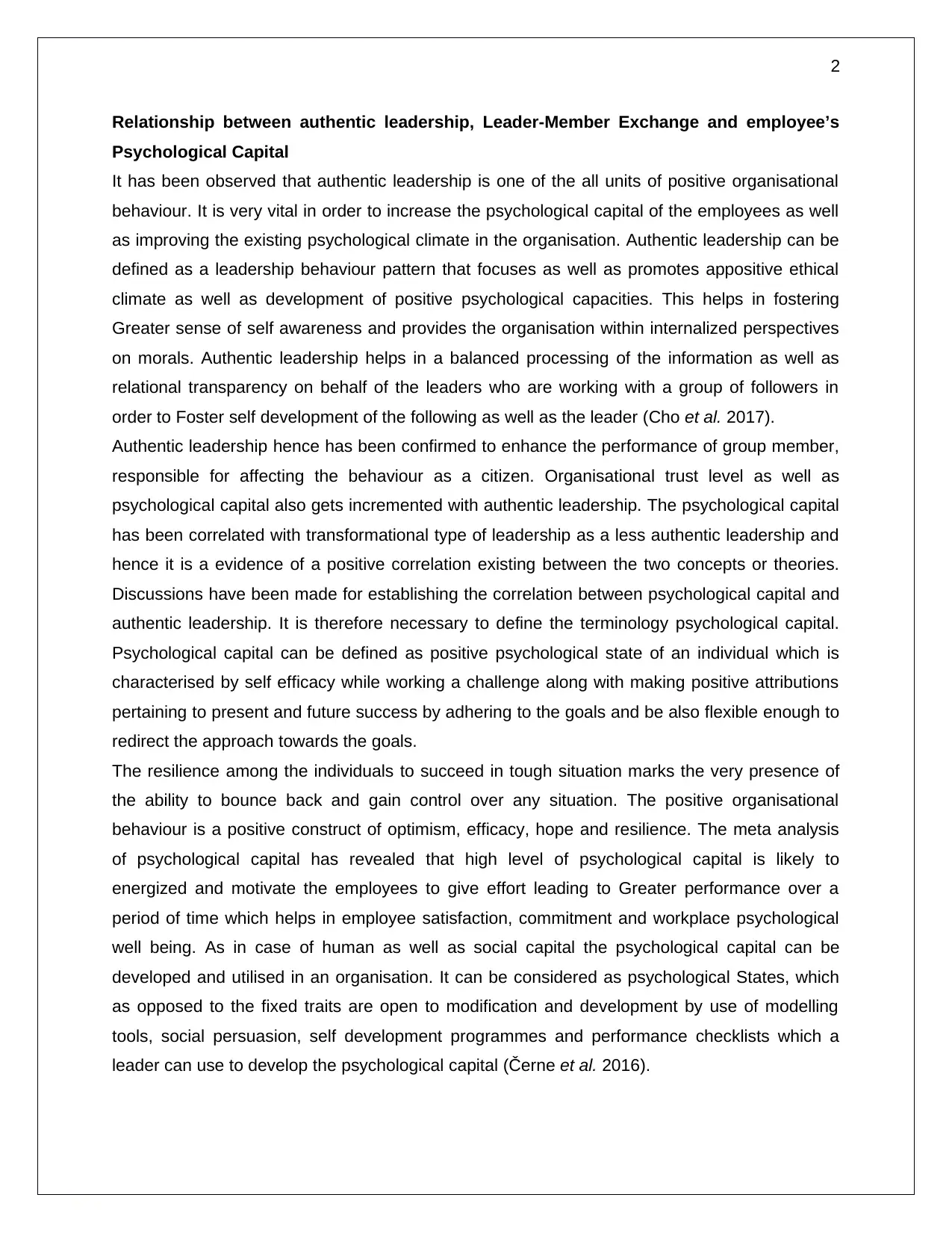
2
Relationship between authentic leadership, Leader-Member Exchange and employee’s
Psychological Capital
It has been observed that authentic leadership is one of the all units of positive organisational
behaviour. It is very vital in order to increase the psychological capital of the employees as well
as improving the existing psychological climate in the organisation. Authentic leadership can be
defined as a leadership behaviour pattern that focuses as well as promotes appositive ethical
climate as well as development of positive psychological capacities. This helps in fostering
Greater sense of self awareness and provides the organisation within internalized perspectives
on morals. Authentic leadership helps in a balanced processing of the information as well as
relational transparency on behalf of the leaders who are working with a group of followers in
order to Foster self development of the following as well as the leader (Cho et al. 2017).
Authentic leadership hence has been confirmed to enhance the performance of group member,
responsible for affecting the behaviour as a citizen. Organisational trust level as well as
psychological capital also gets incremented with authentic leadership. The psychological capital
has been correlated with transformational type of leadership as a less authentic leadership and
hence it is a evidence of a positive correlation existing between the two concepts or theories.
Discussions have been made for establishing the correlation between psychological capital and
authentic leadership. It is therefore necessary to define the terminology psychological capital.
Psychological capital can be defined as positive psychological state of an individual which is
characterised by self efficacy while working a challenge along with making positive attributions
pertaining to present and future success by adhering to the goals and be also flexible enough to
redirect the approach towards the goals.
The resilience among the individuals to succeed in tough situation marks the very presence of
the ability to bounce back and gain control over any situation. The positive organisational
behaviour is a positive construct of optimism, efficacy, hope and resilience. The meta analysis
of psychological capital has revealed that high level of psychological capital is likely to
energized and motivate the employees to give effort leading to Greater performance over a
period of time which helps in employee satisfaction, commitment and workplace psychological
well being. As in case of human as well as social capital the psychological capital can be
developed and utilised in an organisation. It can be considered as psychological States, which
as opposed to the fixed traits are open to modification and development by use of modelling
tools, social persuasion, self development programmes and performance checklists which a
leader can use to develop the psychological capital (Černe et al. 2016).
Relationship between authentic leadership, Leader-Member Exchange and employee’s
Psychological Capital
It has been observed that authentic leadership is one of the all units of positive organisational
behaviour. It is very vital in order to increase the psychological capital of the employees as well
as improving the existing psychological climate in the organisation. Authentic leadership can be
defined as a leadership behaviour pattern that focuses as well as promotes appositive ethical
climate as well as development of positive psychological capacities. This helps in fostering
Greater sense of self awareness and provides the organisation within internalized perspectives
on morals. Authentic leadership helps in a balanced processing of the information as well as
relational transparency on behalf of the leaders who are working with a group of followers in
order to Foster self development of the following as well as the leader (Cho et al. 2017).
Authentic leadership hence has been confirmed to enhance the performance of group member,
responsible for affecting the behaviour as a citizen. Organisational trust level as well as
psychological capital also gets incremented with authentic leadership. The psychological capital
has been correlated with transformational type of leadership as a less authentic leadership and
hence it is a evidence of a positive correlation existing between the two concepts or theories.
Discussions have been made for establishing the correlation between psychological capital and
authentic leadership. It is therefore necessary to define the terminology psychological capital.
Psychological capital can be defined as positive psychological state of an individual which is
characterised by self efficacy while working a challenge along with making positive attributions
pertaining to present and future success by adhering to the goals and be also flexible enough to
redirect the approach towards the goals.
The resilience among the individuals to succeed in tough situation marks the very presence of
the ability to bounce back and gain control over any situation. The positive organisational
behaviour is a positive construct of optimism, efficacy, hope and resilience. The meta analysis
of psychological capital has revealed that high level of psychological capital is likely to
energized and motivate the employees to give effort leading to Greater performance over a
period of time which helps in employee satisfaction, commitment and workplace psychological
well being. As in case of human as well as social capital the psychological capital can be
developed and utilised in an organisation. It can be considered as psychological States, which
as opposed to the fixed traits are open to modification and development by use of modelling
tools, social persuasion, self development programmes and performance checklists which a
leader can use to develop the psychological capital (Černe et al. 2016).
⊘ This is a preview!⊘
Do you want full access?
Subscribe today to unlock all pages.

Trusted by 1+ million students worldwide
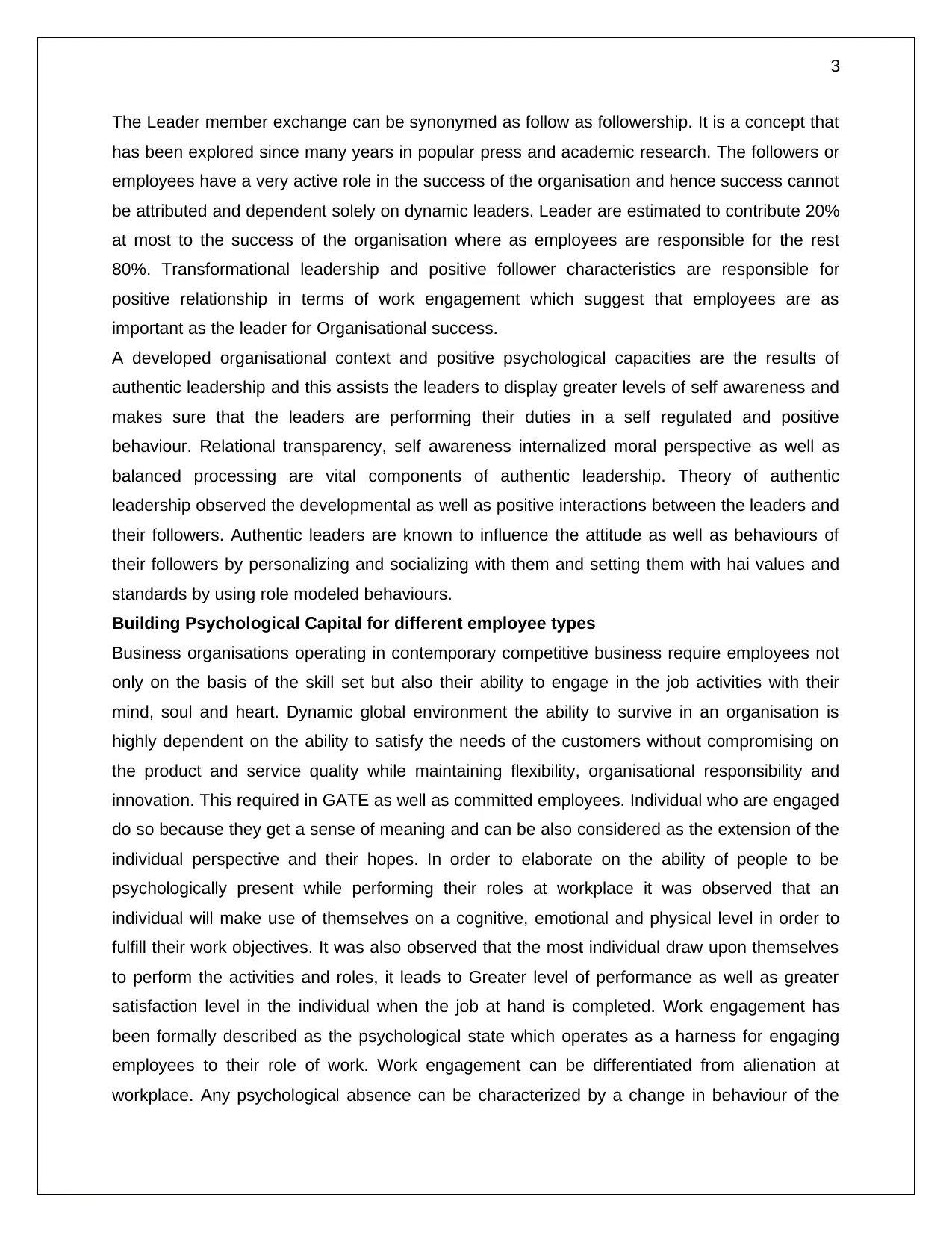
3
The Leader member exchange can be synonymed as follow as followership. It is a concept that
has been explored since many years in popular press and academic research. The followers or
employees have a very active role in the success of the organisation and hence success cannot
be attributed and dependent solely on dynamic leaders. Leader are estimated to contribute 20%
at most to the success of the organisation where as employees are responsible for the rest
80%. Transformational leadership and positive follower characteristics are responsible for
positive relationship in terms of work engagement which suggest that employees are as
important as the leader for Organisational success.
A developed organisational context and positive psychological capacities are the results of
authentic leadership and this assists the leaders to display greater levels of self awareness and
makes sure that the leaders are performing their duties in a self regulated and positive
behaviour. Relational transparency, self awareness internalized moral perspective as well as
balanced processing are vital components of authentic leadership. Theory of authentic
leadership observed the developmental as well as positive interactions between the leaders and
their followers. Authentic leaders are known to influence the attitude as well as behaviours of
their followers by personalizing and socializing with them and setting them with hai values and
standards by using role modeled behaviours.
Building Psychological Capital for different employee types
Business organisations operating in contemporary competitive business require employees not
only on the basis of the skill set but also their ability to engage in the job activities with their
mind, soul and heart. Dynamic global environment the ability to survive in an organisation is
highly dependent on the ability to satisfy the needs of the customers without compromising on
the product and service quality while maintaining flexibility, organisational responsibility and
innovation. This required in GATE as well as committed employees. Individual who are engaged
do so because they get a sense of meaning and can be also considered as the extension of the
individual perspective and their hopes. In order to elaborate on the ability of people to be
psychologically present while performing their roles at workplace it was observed that an
individual will make use of themselves on a cognitive, emotional and physical level in order to
fulfill their work objectives. It was also observed that the most individual draw upon themselves
to perform the activities and roles, it leads to Greater level of performance as well as greater
satisfaction level in the individual when the job at hand is completed. Work engagement has
been formally described as the psychological state which operates as a harness for engaging
employees to their role of work. Work engagement can be differentiated from alienation at
workplace. Any psychological absence can be characterized by a change in behaviour of the
The Leader member exchange can be synonymed as follow as followership. It is a concept that
has been explored since many years in popular press and academic research. The followers or
employees have a very active role in the success of the organisation and hence success cannot
be attributed and dependent solely on dynamic leaders. Leader are estimated to contribute 20%
at most to the success of the organisation where as employees are responsible for the rest
80%. Transformational leadership and positive follower characteristics are responsible for
positive relationship in terms of work engagement which suggest that employees are as
important as the leader for Organisational success.
A developed organisational context and positive psychological capacities are the results of
authentic leadership and this assists the leaders to display greater levels of self awareness and
makes sure that the leaders are performing their duties in a self regulated and positive
behaviour. Relational transparency, self awareness internalized moral perspective as well as
balanced processing are vital components of authentic leadership. Theory of authentic
leadership observed the developmental as well as positive interactions between the leaders and
their followers. Authentic leaders are known to influence the attitude as well as behaviours of
their followers by personalizing and socializing with them and setting them with hai values and
standards by using role modeled behaviours.
Building Psychological Capital for different employee types
Business organisations operating in contemporary competitive business require employees not
only on the basis of the skill set but also their ability to engage in the job activities with their
mind, soul and heart. Dynamic global environment the ability to survive in an organisation is
highly dependent on the ability to satisfy the needs of the customers without compromising on
the product and service quality while maintaining flexibility, organisational responsibility and
innovation. This required in GATE as well as committed employees. Individual who are engaged
do so because they get a sense of meaning and can be also considered as the extension of the
individual perspective and their hopes. In order to elaborate on the ability of people to be
psychologically present while performing their roles at workplace it was observed that an
individual will make use of themselves on a cognitive, emotional and physical level in order to
fulfill their work objectives. It was also observed that the most individual draw upon themselves
to perform the activities and roles, it leads to Greater level of performance as well as greater
satisfaction level in the individual when the job at hand is completed. Work engagement has
been formally described as the psychological state which operates as a harness for engaging
employees to their role of work. Work engagement can be differentiated from alienation at
workplace. Any psychological absence can be characterized by a change in behaviour of the
Paraphrase This Document
Need a fresh take? Get an instant paraphrase of this document with our AI Paraphraser
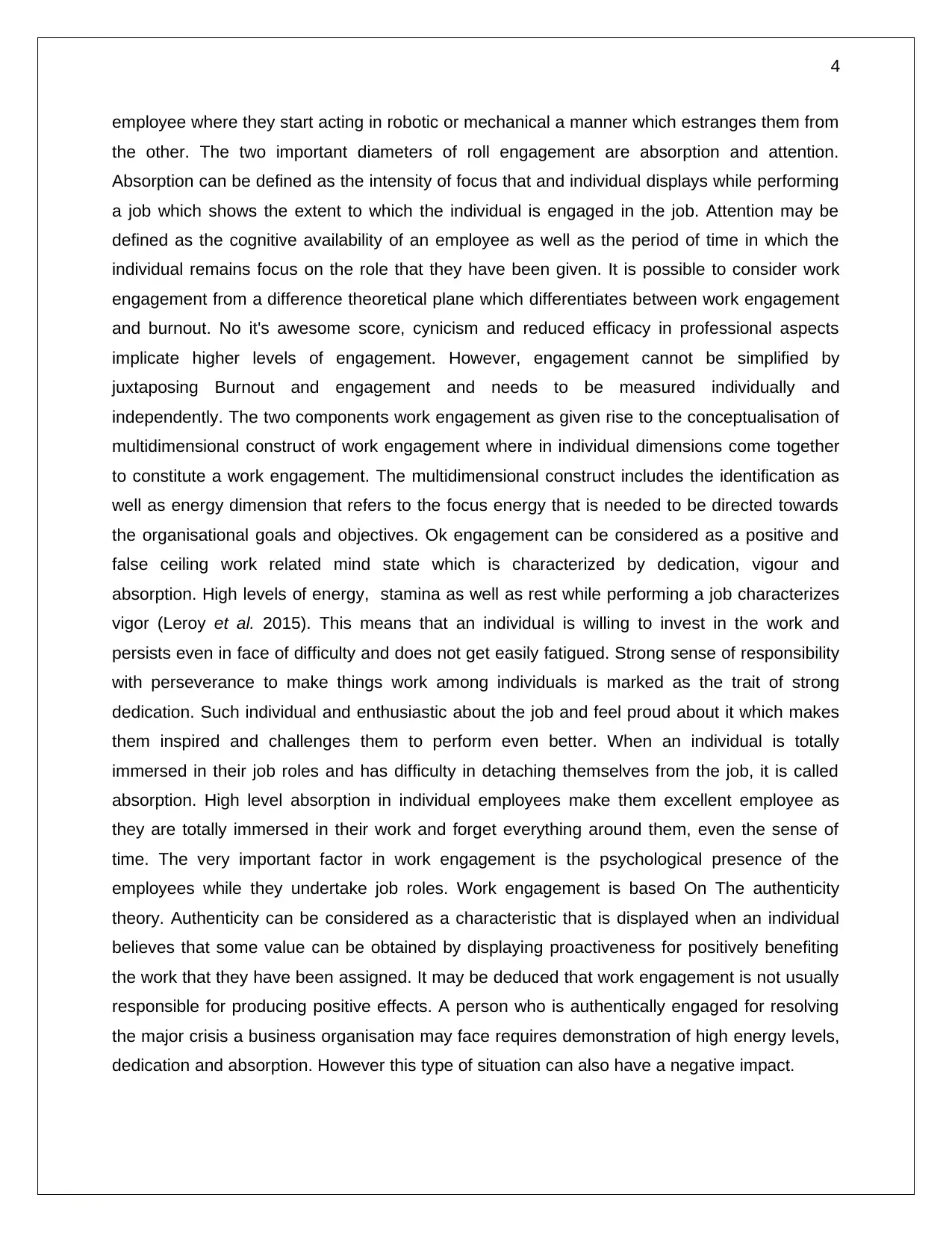
4
employee where they start acting in robotic or mechanical a manner which estranges them from
the other. The two important diameters of roll engagement are absorption and attention.
Absorption can be defined as the intensity of focus that and individual displays while performing
a job which shows the extent to which the individual is engaged in the job. Attention may be
defined as the cognitive availability of an employee as well as the period of time in which the
individual remains focus on the role that they have been given. It is possible to consider work
engagement from a difference theoretical plane which differentiates between work engagement
and burnout. No it's awesome score, cynicism and reduced efficacy in professional aspects
implicate higher levels of engagement. However, engagement cannot be simplified by
juxtaposing Burnout and engagement and needs to be measured individually and
independently. The two components work engagement as given rise to the conceptualisation of
multidimensional construct of work engagement where in individual dimensions come together
to constitute a work engagement. The multidimensional construct includes the identification as
well as energy dimension that refers to the focus energy that is needed to be directed towards
the organisational goals and objectives. Ok engagement can be considered as a positive and
false ceiling work related mind state which is characterized by dedication, vigour and
absorption. High levels of energy, stamina as well as rest while performing a job characterizes
vigor (Leroy et al. 2015). This means that an individual is willing to invest in the work and
persists even in face of difficulty and does not get easily fatigued. Strong sense of responsibility
with perseverance to make things work among individuals is marked as the trait of strong
dedication. Such individual and enthusiastic about the job and feel proud about it which makes
them inspired and challenges them to perform even better. When an individual is totally
immersed in their job roles and has difficulty in detaching themselves from the job, it is called
absorption. High level absorption in individual employees make them excellent employee as
they are totally immersed in their work and forget everything around them, even the sense of
time. The very important factor in work engagement is the psychological presence of the
employees while they undertake job roles. Work engagement is based On The authenticity
theory. Authenticity can be considered as a characteristic that is displayed when an individual
believes that some value can be obtained by displaying proactiveness for positively benefiting
the work that they have been assigned. It may be deduced that work engagement is not usually
responsible for producing positive effects. A person who is authentically engaged for resolving
the major crisis a business organisation may face requires demonstration of high energy levels,
dedication and absorption. However this type of situation can also have a negative impact.
employee where they start acting in robotic or mechanical a manner which estranges them from
the other. The two important diameters of roll engagement are absorption and attention.
Absorption can be defined as the intensity of focus that and individual displays while performing
a job which shows the extent to which the individual is engaged in the job. Attention may be
defined as the cognitive availability of an employee as well as the period of time in which the
individual remains focus on the role that they have been given. It is possible to consider work
engagement from a difference theoretical plane which differentiates between work engagement
and burnout. No it's awesome score, cynicism and reduced efficacy in professional aspects
implicate higher levels of engagement. However, engagement cannot be simplified by
juxtaposing Burnout and engagement and needs to be measured individually and
independently. The two components work engagement as given rise to the conceptualisation of
multidimensional construct of work engagement where in individual dimensions come together
to constitute a work engagement. The multidimensional construct includes the identification as
well as energy dimension that refers to the focus energy that is needed to be directed towards
the organisational goals and objectives. Ok engagement can be considered as a positive and
false ceiling work related mind state which is characterized by dedication, vigour and
absorption. High levels of energy, stamina as well as rest while performing a job characterizes
vigor (Leroy et al. 2015). This means that an individual is willing to invest in the work and
persists even in face of difficulty and does not get easily fatigued. Strong sense of responsibility
with perseverance to make things work among individuals is marked as the trait of strong
dedication. Such individual and enthusiastic about the job and feel proud about it which makes
them inspired and challenges them to perform even better. When an individual is totally
immersed in their job roles and has difficulty in detaching themselves from the job, it is called
absorption. High level absorption in individual employees make them excellent employee as
they are totally immersed in their work and forget everything around them, even the sense of
time. The very important factor in work engagement is the psychological presence of the
employees while they undertake job roles. Work engagement is based On The authenticity
theory. Authenticity can be considered as a characteristic that is displayed when an individual
believes that some value can be obtained by displaying proactiveness for positively benefiting
the work that they have been assigned. It may be deduced that work engagement is not usually
responsible for producing positive effects. A person who is authentically engaged for resolving
the major crisis a business organisation may face requires demonstration of high energy levels,
dedication and absorption. However this type of situation can also have a negative impact.
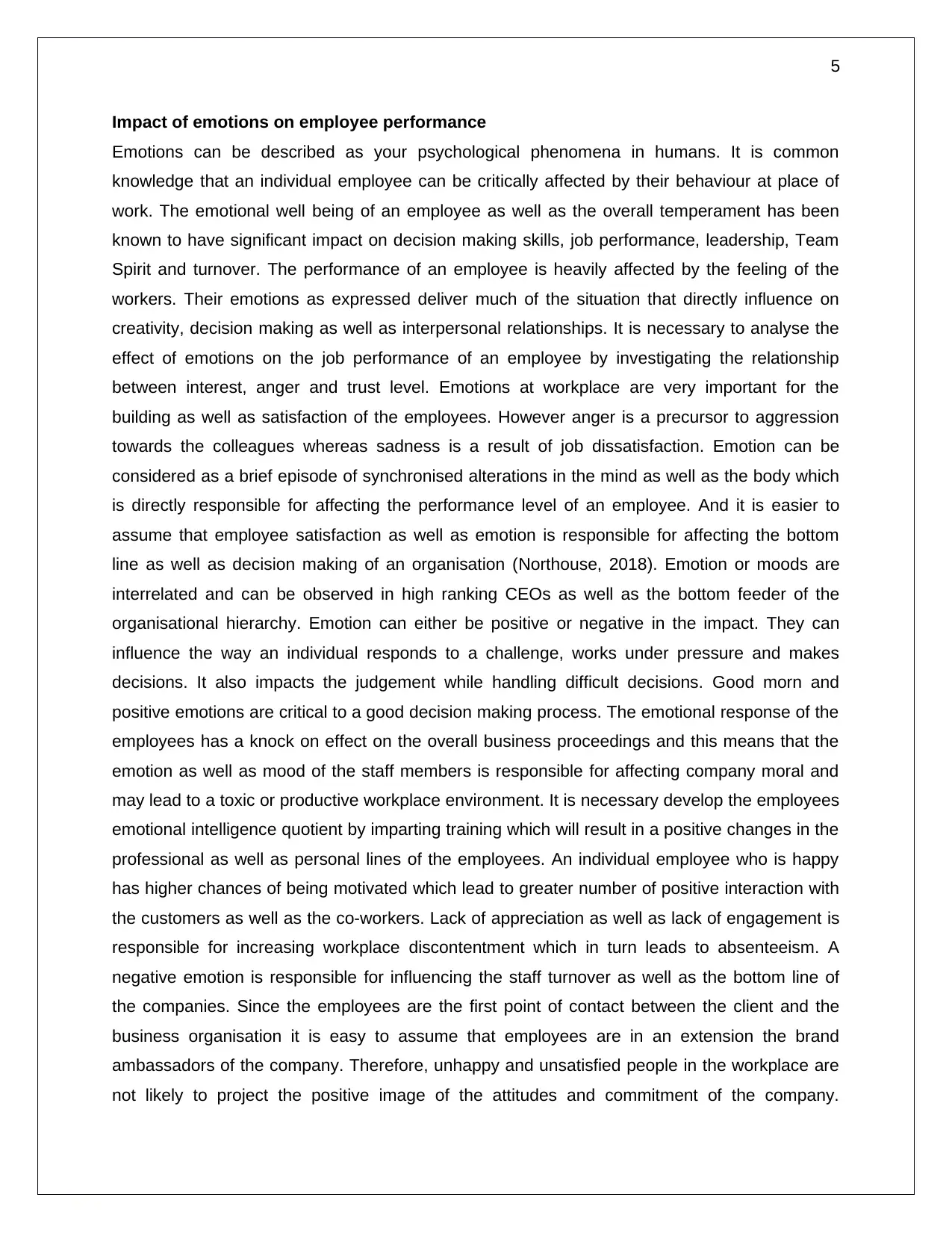
5
Impact of emotions on employee performance
Emotions can be described as your psychological phenomena in humans. It is common
knowledge that an individual employee can be critically affected by their behaviour at place of
work. The emotional well being of an employee as well as the overall temperament has been
known to have significant impact on decision making skills, job performance, leadership, Team
Spirit and turnover. The performance of an employee is heavily affected by the feeling of the
workers. Their emotions as expressed deliver much of the situation that directly influence on
creativity, decision making as well as interpersonal relationships. It is necessary to analyse the
effect of emotions on the job performance of an employee by investigating the relationship
between interest, anger and trust level. Emotions at workplace are very important for the
building as well as satisfaction of the employees. However anger is a precursor to aggression
towards the colleagues whereas sadness is a result of job dissatisfaction. Emotion can be
considered as a brief episode of synchronised alterations in the mind as well as the body which
is directly responsible for affecting the performance level of an employee. And it is easier to
assume that employee satisfaction as well as emotion is responsible for affecting the bottom
line as well as decision making of an organisation (Northouse, 2018). Emotion or moods are
interrelated and can be observed in high ranking CEOs as well as the bottom feeder of the
organisational hierarchy. Emotion can either be positive or negative in the impact. They can
influence the way an individual responds to a challenge, works under pressure and makes
decisions. It also impacts the judgement while handling difficult decisions. Good morn and
positive emotions are critical to a good decision making process. The emotional response of the
employees has a knock on effect on the overall business proceedings and this means that the
emotion as well as mood of the staff members is responsible for affecting company moral and
may lead to a toxic or productive workplace environment. It is necessary develop the employees
emotional intelligence quotient by imparting training which will result in a positive changes in the
professional as well as personal lines of the employees. An individual employee who is happy
has higher chances of being motivated which lead to greater number of positive interaction with
the customers as well as the co-workers. Lack of appreciation as well as lack of engagement is
responsible for increasing workplace discontentment which in turn leads to absenteeism. A
negative emotion is responsible for influencing the staff turnover as well as the bottom line of
the companies. Since the employees are the first point of contact between the client and the
business organisation it is easy to assume that employees are in an extension the brand
ambassadors of the company. Therefore, unhappy and unsatisfied people in the workplace are
not likely to project the positive image of the attitudes and commitment of the company.
Impact of emotions on employee performance
Emotions can be described as your psychological phenomena in humans. It is common
knowledge that an individual employee can be critically affected by their behaviour at place of
work. The emotional well being of an employee as well as the overall temperament has been
known to have significant impact on decision making skills, job performance, leadership, Team
Spirit and turnover. The performance of an employee is heavily affected by the feeling of the
workers. Their emotions as expressed deliver much of the situation that directly influence on
creativity, decision making as well as interpersonal relationships. It is necessary to analyse the
effect of emotions on the job performance of an employee by investigating the relationship
between interest, anger and trust level. Emotions at workplace are very important for the
building as well as satisfaction of the employees. However anger is a precursor to aggression
towards the colleagues whereas sadness is a result of job dissatisfaction. Emotion can be
considered as a brief episode of synchronised alterations in the mind as well as the body which
is directly responsible for affecting the performance level of an employee. And it is easier to
assume that employee satisfaction as well as emotion is responsible for affecting the bottom
line as well as decision making of an organisation (Northouse, 2018). Emotion or moods are
interrelated and can be observed in high ranking CEOs as well as the bottom feeder of the
organisational hierarchy. Emotion can either be positive or negative in the impact. They can
influence the way an individual responds to a challenge, works under pressure and makes
decisions. It also impacts the judgement while handling difficult decisions. Good morn and
positive emotions are critical to a good decision making process. The emotional response of the
employees has a knock on effect on the overall business proceedings and this means that the
emotion as well as mood of the staff members is responsible for affecting company moral and
may lead to a toxic or productive workplace environment. It is necessary develop the employees
emotional intelligence quotient by imparting training which will result in a positive changes in the
professional as well as personal lines of the employees. An individual employee who is happy
has higher chances of being motivated which lead to greater number of positive interaction with
the customers as well as the co-workers. Lack of appreciation as well as lack of engagement is
responsible for increasing workplace discontentment which in turn leads to absenteeism. A
negative emotion is responsible for influencing the staff turnover as well as the bottom line of
the companies. Since the employees are the first point of contact between the client and the
business organisation it is easy to assume that employees are in an extension the brand
ambassadors of the company. Therefore, unhappy and unsatisfied people in the workplace are
not likely to project the positive image of the attitudes and commitment of the company.
⊘ This is a preview!⊘
Do you want full access?
Subscribe today to unlock all pages.

Trusted by 1+ million students worldwide
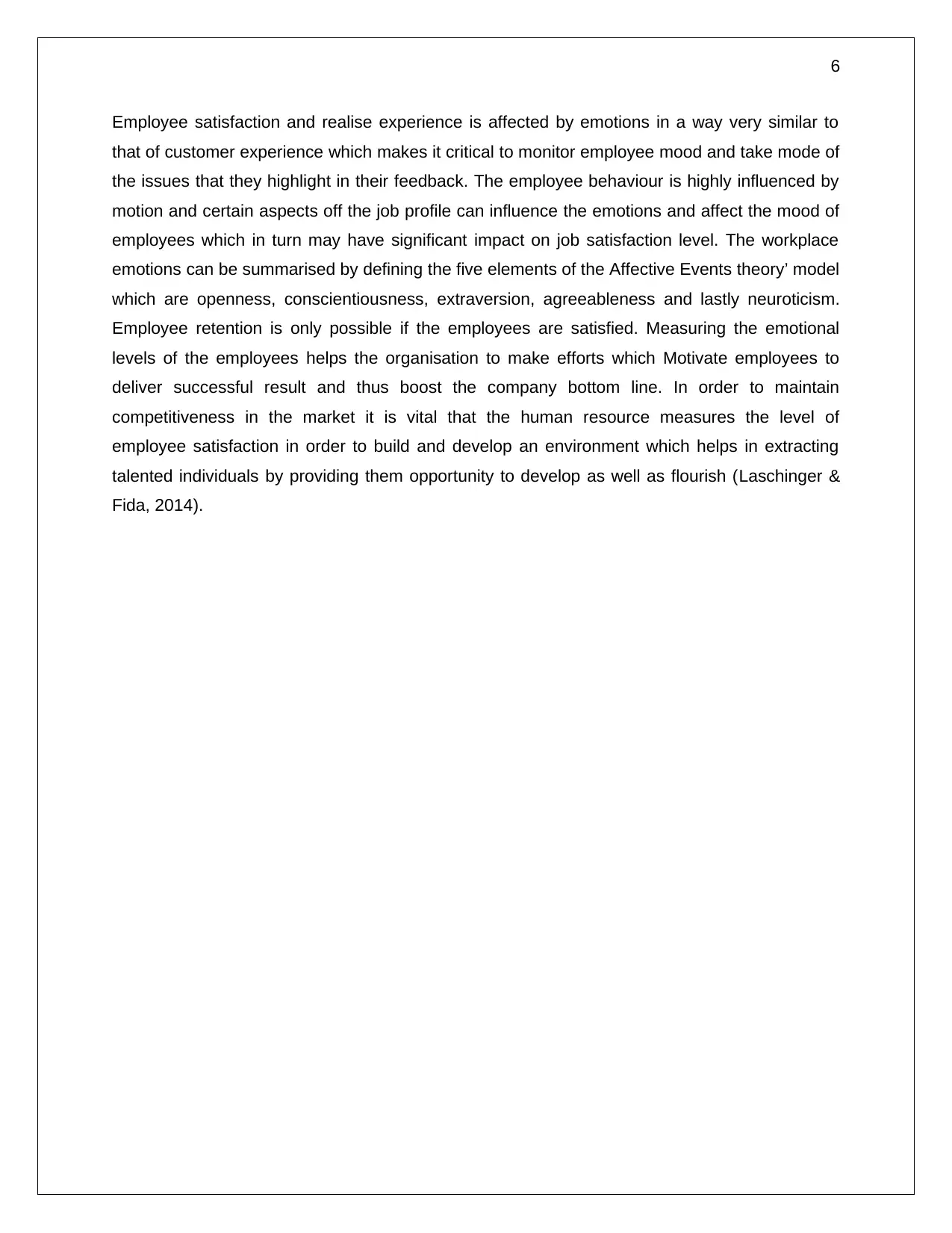
6
Employee satisfaction and realise experience is affected by emotions in a way very similar to
that of customer experience which makes it critical to monitor employee mood and take mode of
the issues that they highlight in their feedback. The employee behaviour is highly influenced by
motion and certain aspects off the job profile can influence the emotions and affect the mood of
employees which in turn may have significant impact on job satisfaction level. The workplace
emotions can be summarised by defining the five elements of the Affective Events theory’ model
which are openness, conscientiousness, extraversion, agreeableness and lastly neuroticism.
Employee retention is only possible if the employees are satisfied. Measuring the emotional
levels of the employees helps the organisation to make efforts which Motivate employees to
deliver successful result and thus boost the company bottom line. In order to maintain
competitiveness in the market it is vital that the human resource measures the level of
employee satisfaction in order to build and develop an environment which helps in extracting
talented individuals by providing them opportunity to develop as well as flourish (Laschinger &
Fida, 2014).
Employee satisfaction and realise experience is affected by emotions in a way very similar to
that of customer experience which makes it critical to monitor employee mood and take mode of
the issues that they highlight in their feedback. The employee behaviour is highly influenced by
motion and certain aspects off the job profile can influence the emotions and affect the mood of
employees which in turn may have significant impact on job satisfaction level. The workplace
emotions can be summarised by defining the five elements of the Affective Events theory’ model
which are openness, conscientiousness, extraversion, agreeableness and lastly neuroticism.
Employee retention is only possible if the employees are satisfied. Measuring the emotional
levels of the employees helps the organisation to make efforts which Motivate employees to
deliver successful result and thus boost the company bottom line. In order to maintain
competitiveness in the market it is vital that the human resource measures the level of
employee satisfaction in order to build and develop an environment which helps in extracting
talented individuals by providing them opportunity to develop as well as flourish (Laschinger &
Fida, 2014).
Paraphrase This Document
Need a fresh take? Get an instant paraphrase of this document with our AI Paraphraser
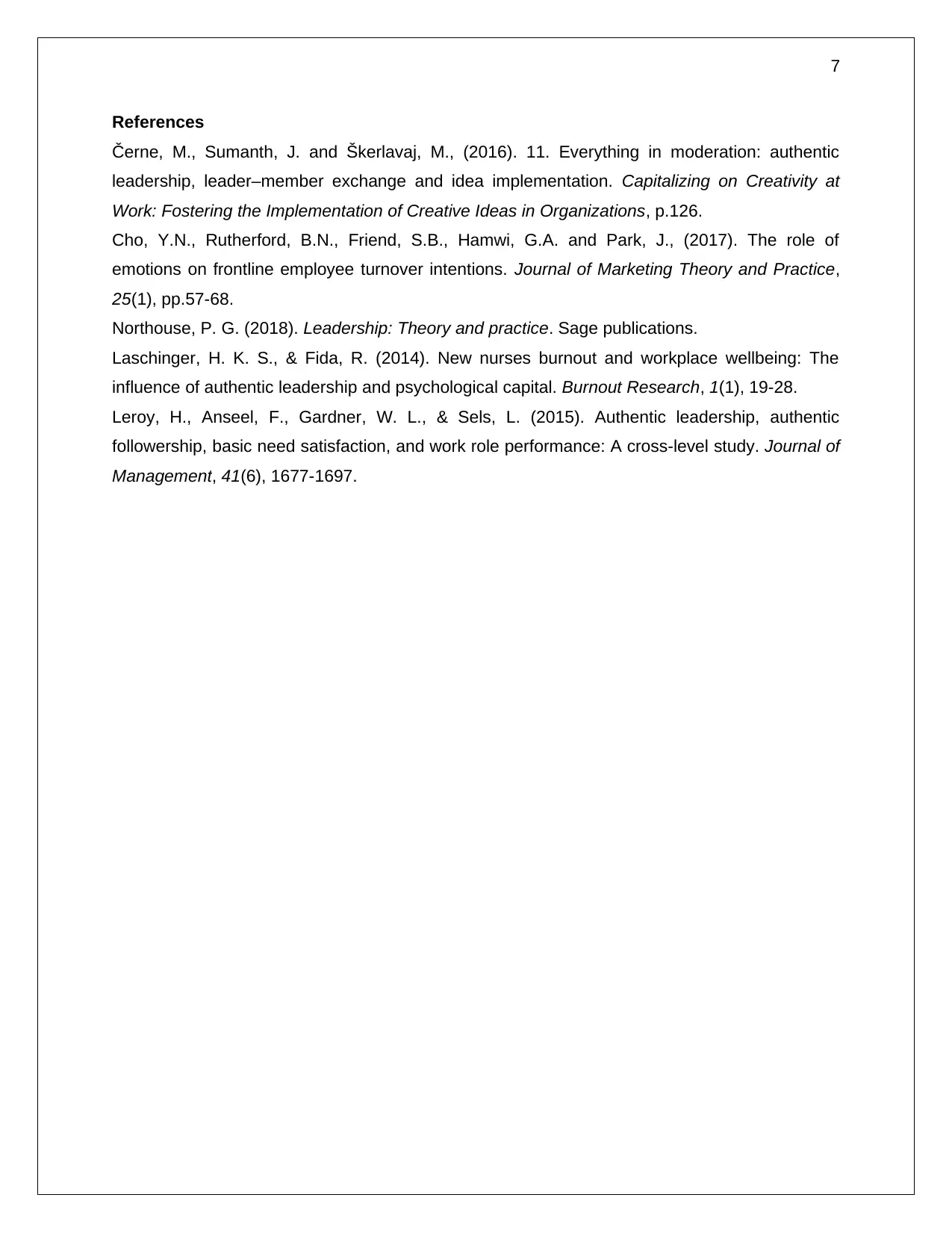
7
References
Černe, M., Sumanth, J. and Škerlavaj, M., (2016). 11. Everything in moderation: authentic
leadership, leader–member exchange and idea implementation. Capitalizing on Creativity at
Work: Fostering the Implementation of Creative Ideas in Organizations, p.126.
Cho, Y.N., Rutherford, B.N., Friend, S.B., Hamwi, G.A. and Park, J., (2017). The role of
emotions on frontline employee turnover intentions. Journal of Marketing Theory and Practice,
25(1), pp.57-68.
Northouse, P. G. (2018). Leadership: Theory and practice. Sage publications.
Laschinger, H. K. S., & Fida, R. (2014). New nurses burnout and workplace wellbeing: The
influence of authentic leadership and psychological capital. Burnout Research, 1(1), 19-28.
Leroy, H., Anseel, F., Gardner, W. L., & Sels, L. (2015). Authentic leadership, authentic
followership, basic need satisfaction, and work role performance: A cross-level study. Journal of
Management, 41(6), 1677-1697.
References
Černe, M., Sumanth, J. and Škerlavaj, M., (2016). 11. Everything in moderation: authentic
leadership, leader–member exchange and idea implementation. Capitalizing on Creativity at
Work: Fostering the Implementation of Creative Ideas in Organizations, p.126.
Cho, Y.N., Rutherford, B.N., Friend, S.B., Hamwi, G.A. and Park, J., (2017). The role of
emotions on frontline employee turnover intentions. Journal of Marketing Theory and Practice,
25(1), pp.57-68.
Northouse, P. G. (2018). Leadership: Theory and practice. Sage publications.
Laschinger, H. K. S., & Fida, R. (2014). New nurses burnout and workplace wellbeing: The
influence of authentic leadership and psychological capital. Burnout Research, 1(1), 19-28.
Leroy, H., Anseel, F., Gardner, W. L., & Sels, L. (2015). Authentic leadership, authentic
followership, basic need satisfaction, and work role performance: A cross-level study. Journal of
Management, 41(6), 1677-1697.
1 out of 8
Related Documents
Your All-in-One AI-Powered Toolkit for Academic Success.
+13062052269
info@desklib.com
Available 24*7 on WhatsApp / Email
![[object Object]](/_next/static/media/star-bottom.7253800d.svg)
Unlock your academic potential
Copyright © 2020–2026 A2Z Services. All Rights Reserved. Developed and managed by ZUCOL.





